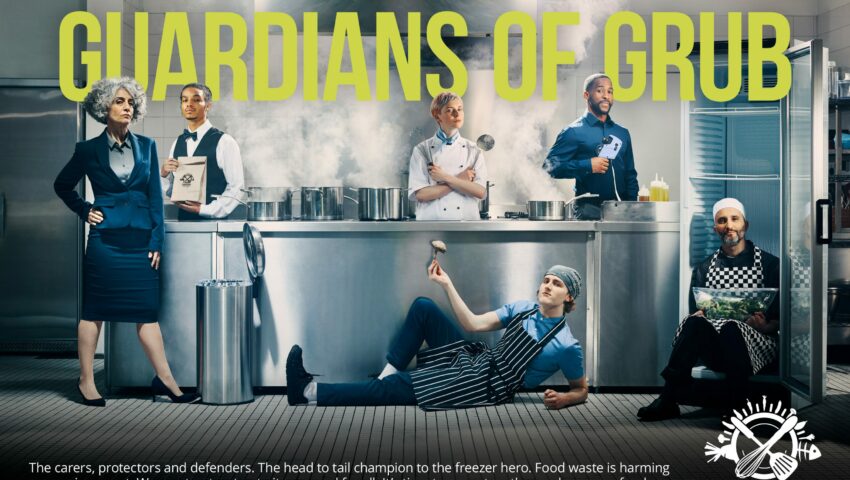Blogs
Make 2020 the year you tackle food waste

Make tackling food waste your new year’s resolution and bask in the glow of saving money, saving food and doing your bit to help the climate too.
‘Guardians of Grub’ is a campaign designed for the hospitality and food service sector to help reduce its impact on the climate and limit the amount of food thrown away. It is about empowering kitchens and the individuals who work in hospitality to be more efficient by sharing free tips, tools and case studies to ensure operators are focused on feeding people, not bins.
Here are some tips to tackling food waste, along with some insights from the front line from bartlett mitchell’s Chef Director and Guardians of Grub Ambassador Pete Redman.
Get the right portion size.
Offer portion sizes and side dish options as well as takeaway doggy boxes. There’s nothing nicer than seeing diners go home with a treat for another day. Asking about what they want in the first place will help avoid unnecessary waste.
“Plate waste is a real problem,” agrees Pete. “This is linked to perceived value for money with our customer base, and it is even more challenging in hospitality where over ordering is a very common practice. To tackle this, we record food wasted, and discuss these figures with the bookers to highlight the volume of food being wasted so they can work with the client to reduce it.”
- WRAP case study: The Ship Inn. Plate waste was reduced by 67% by putting out smaller portions of sauce and offering smaller portion sizes, particularly chips. The kitchen also stopped putting garnishes on sandwiches, burgers and other meals.
Clever ordering can cut waste.
Check your stock and purchase only what you need for what’s coming up. Try buying smaller portions of fresh produce (and ordering more often), as well as supporting local suppliers – you’ll get fresh seasonal produce. You can keep track of how you are doing with our Guardians of Grub tracking sheets to see how you can improve and to keep everyone focused on keeping good food out of the bin.
- Case study: Greene King. Too much food was being prepared late in the evening service period, after the main evening peak, which led to unnecessary spoilage. By tracking bookings and customer numbers in the restaurant, requirements for defrosting and other preparation could be more carefully controlled, reducing wastage of high value ingredients.
Savvy storage stops waste.
First in, first out! Store newer items at the back to ensure older items are used first, and label and date new supplies as they come in. Use airtight containers or cling film to keep ingredients fresh – or freeze them. Look at how leftovers can be utilised in new dishes; items not served might make additions to the next meal. Freeze and defrost meat in batches, rather than all at once.
“One way we try and tackle stock-related waste at bartlett mitchell is by doing a kitchen management training course at head office every quarter,” explains Pete. “A big part of it is wastage and fridge management. This gives advice and guidance on ordering, stock rotation, fridge management, preparation and preservation.”
Create a smart menu.
Explore ways of using the same ingredients for different dishes. Use cooking methods for meat, fruit and vegetables and herbs that make the most of ingredients. Be creative by using leftover ingredients and offcuts.
- Case study: Dragon Hotel. Better menu design, supported by a new stock control system, has led to a 25% decrease in perishable food purchasing costs.
Engage with your customers.
Let them know you care about what happens to the food you are serving and that ensuring they get the very best, without waste, is important to you. Find out what food they don’t like and leave it out of their meal – FSA research shows that people increasingly care about food waste, so this approach will help them take action.
“We cook as fresh as possible and in batches so we aren’t just ‘cooking for cooking sake’ and can instead respond to customer demand,” says Pete. “Customer service is key in our world and we can adjust or customise the dish to exactly what or how much they want so there is nothing on the plate that doesn’t need to be. This really helps to avoid food waste.”
Ensure staff have essential skills.
Empower staff and train them on how to avoid food going to waste. Review your preparation schedule and food handling procedures and remove less popular or time-consuming dishes from your menu.
Target, measure, act.
You can work out which top tips are best for you by tracking where the food thrown away on your site is coming from. This will allow you to find the hot spots, working with your kitchen team to find out how you can save and see how this makes a difference straight to the bottom line. Check out the operational tools here to find out more.
More free tools, tips and case studies can be found at www.guardiansofgrub.com.
Written by Eleanor Morris
Guardians of Grub expert






